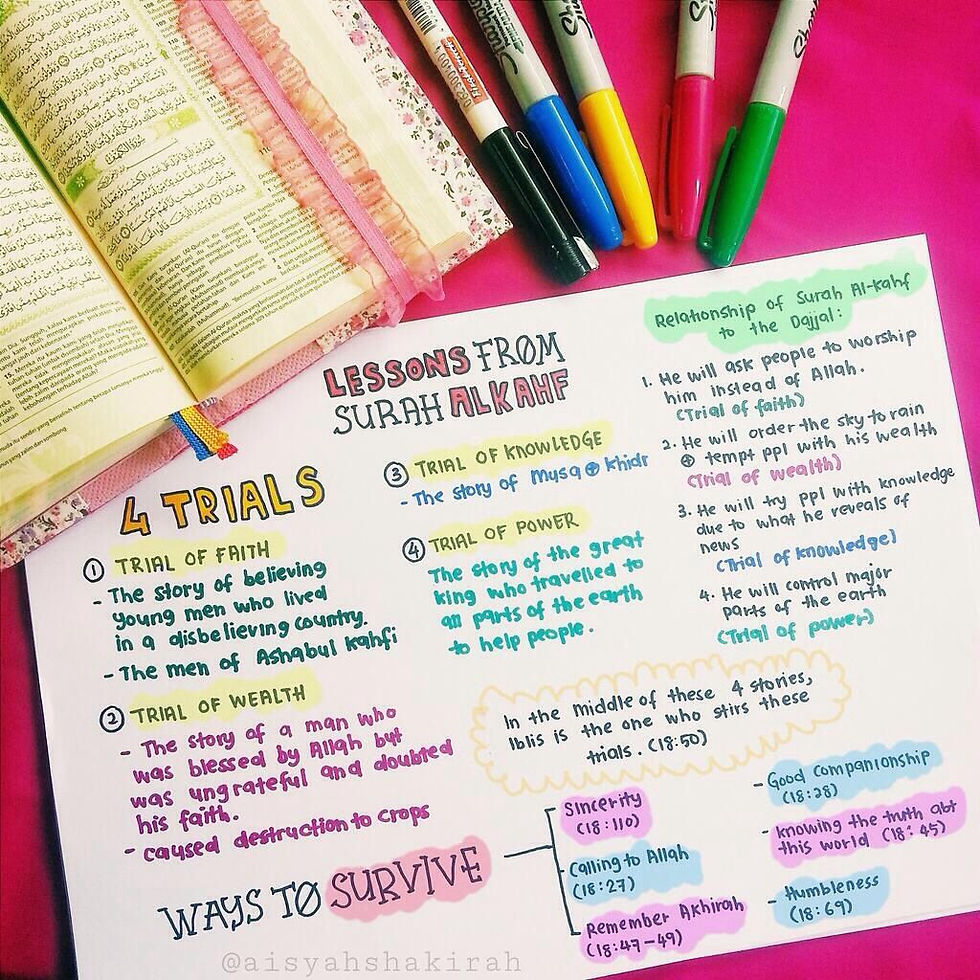The Prophet (PBUH) said: “One who memorized the first ten ayats of Surah al Kahf will be secure against the Dajjal (Anti-Christ).” (Muslim) Surah Al-Kahf is 18th Surah of the Quran. It includes four historical stories, each with an amazing lesson.

The most important thing to be noted about this surah is its preponderant narration of events that took place in the past. First we have the story of the sleepers in the cave, followed by that of the man with two gardens, then a reference to Adam and Satan.
The central theme in the surah, to which all its accounts and ideas relate, is to purge faith of all alien concepts. It seeks to establish correct and accurate thought and reasoning, as also establish values that are sound according to the criterion of the Islamic faith. Purging faith of alien concepts is determined both at the outset and conclusion. The surah opens with these ayats:
ٱلْحَمْدُ لِلَّهِ ٱلَّذِىٓ أَنزَلَ عَلَىٰ عَبْدِهِ ٱلْكِتَـٰبَ وَلَمْ يَجْعَل لَّهُۥ عِوَجَا ۜ
قَيِّمًۭا لِّيُنذِرَ بَأْسًۭا شَدِيدًۭا مِّن لَّدُنْهُ وَيُبَشِّرَ ٱلْمُؤْمِنِينَ ٱلَّذِينَ يَعْمَلُونَ ٱلصَّـٰلِحَـٰتِ أَنَّ لَهُمْ أَجْرًا حَسَنًۭا مَّـٰكِثِينَ فِيهِ أَبَدًۭا
وَيُنذِرَ ٱلَّذِينَ قَالُوا۟ ٱتَّخَذَ ٱللَّهُ وَلَدًۭا
مَّا لَهُم بِهِۦ مِنْ عِلْمٍۢ وَلَا لِءَابَآئِهِمْ ۚ كَبُرَتْ كَلِمَةًۭ تَخْرُجُ مِنْ أَفْوَٰهِهِمْ ۚ إِن يَقُولُونَ إِلَّا كَذِبًۭا
“All praise is due to Allah who has bestowed this book from on high on His servant, and has ensured that it remains free of distortion, unerringly straight, meant to warn people of a severe punishment from Himself and to give the believers who do good works the happy news that they shall have a goodly reward which continues to be theirs forever. Furthermore, it warns those who assert, ‘Allah has taken to Himself a son.’ No knowledge whatever have they of Him, and neither had their forefathers. Dreadful indeed is this saying that issues from their mouths. Nothing but falsehood do they utter.” (Ayats 1- 5)
قُلْ إِنَّمَا أَنَا بَشَرٌ مِثْلُكُمْ يُوحَىٰ إِلَيَّ أَنَّمَا إِلَٰهُكُمْ إِلَٰهٌ وَاحِدٌ ۖ فَمَنْ كَانَ يَرْجُو لِقَاءَ رَبِّهِ فَلْيَعْمَلْ عَمَلًا صَالِحًا وَلَا يُشْرِكْ بِعِبَادَةِ رَبِّهِ أَحَدًا
The surah concludes with: “Say: ‘I am but a human being like yourselves. It has been revealed to me that your Allah is the One and only God. Hence, whoever expects to meet his Lord [on Judgement Day’, let him do what is right, and in the worship due to his Lord admit no one as partner.” (Ayat 110)
Thus, the surah begins and ends with -
declaring Allah’s oneness
rejecting any concept that associates partners with Allah
accepting revelation as true
making a clear and absolute distinction between Allah and other beings
1️. A Trial of Faith - (The Story of Young Men with Clear Insight)
We shall relate to you their story in all truth. They were young men who believed in their Lord, so We increased them in guidance. We put courage in their hearts, so that they stood up and said: ‘Our Lord is the Lord of the heavens and the earth. Never shall we call upon any deity other than Him. If we did, we should indeed have uttered an enormity! These people of ours have taken for worship deities other than Him, without being able to show any convincing proof of their beliefs. Who does more wrong than he who invents a lie about God? Hence, now that you have withdrawn from them and all that they worship instead of God, take refuge in the cave. God may well spread His grace over you and make fitting arrangements for you in your affairs.’ (Ayats 13-16)
♦️ The attitude of the youths appears to be clear, open and straightforward.
♦️ They are resolute in their adoption of the faith, betraying no hesitation whatsoever.
♦️ They were very strong physically and mentally, and strong in their faith and in their rejection of the way followed by their community.
♦️ They were driven out of their homes because they denied Submission to anyone except Allah.
♦️ They were Steadfast upon Tawheed.
♦️ They came from Different homes, And it so happened that they got collected in one place.
♦️ They ended up in a cave where Allah made them sleep for many years (309 lunar years which is 300 solar years). Cave was in such a location that, Direct Sunrays were not able to reach, Only Reflective light was able to reach the cave, that made their Existence Possible.
♦️When they woke up after 300 years, they felt they had slept for just a day or half a day.
♦️One of them went to the town to get some food disguising himself thinking that the people would recognize and harm him. Only to find himself amongst a different people.
♦️ The people of the town were amazed at his appearance of this man and the old coins he was using.
➖➖➖➖➖➖➖➖➖➖➖➖➖
The Biblical version of the story is called ‘ The Seven Sleepers of Ephesus”, however, the Qur’an doesn’t mention the number of those who were in the cave.
(Some) say they were three, the dog being the fourth among them; (others) say they were five, the dog being the sixth,- doubtfully guessing at the unknown; (yet others) say they were seven, the dog being the eighth.
Allah Knows Best Their Number
“My Lord knows best their number; It is but few that know their (real case).” Enter not, therefore, into controversies concerning them, except on a matter that is clear, nor consult any of them about (the affair of) the Sleepers. (Surah 18:22)
Moral: The story shows us how Allah protects the righteous who believe in Him no matter how hard their situation is.
A final comment is added about the whole story in which we see faith in Allah’s oneness clearly apparent in all its details: “No guardian have they apart from Him; nor does He allot to anyone a share in His rule.” (Surah 18:26) A further comment is added in the form of a directive to the Prophet
to recite what Allah has revealed to him, as it represents the final word, and the truth that admits no falsehood whatsoever.
He should seek refuge with Allah, for no one can provide any shelter other than He (SWT).
When the young men of the cave sought His protection, He spread His grace over them and provided them with His guidance: Recite whatever has been revealed to you of your Lords book. There is nothing that could alter His words. You shall find no refuge other than with Him. (Surah18:27)

2. Trial of Wealth - The Story of the man who owns two gardens
Set forth to them the case of two men, to one of whom We gave two vineyards and surrounded them with date palms, and placed a field of grain in between. Each of the two gardens yielded its produce and never failed to do so in any way. In the midst of them We caused a stream to flow. And so [the man] had fruit in abundance. (Surah 18:32-34) The two gardens are full of fruit, having vineyards which are made even more splendid with a siege of date palms. In between the two gardens is a large field which the man uses to cultivate grains and other plants. A river running in between the two gardens adds much that is pleasant to the whole scene, because the running water reassures the owner of inexhaustible produce that, in turn, bring much wealth.
We actually see the man going into one of his gardens, gratified as he looks at it. He is full of pride, strutting like a peacock, calling for admiration. He speaks arrogantly to his friend whom he knows to be of limited means: “This man said once to his friend, in the course of a discussion between them, More wealth have I than you, and more power and followers.’” (Surah 18:34) He then walks into one of the two gardens with his friend.
His attitude is that of someone conceited and ungrateful. He has completely forgotten Allah, thinking that the two gardens will never fail to yield their produce. In the height of this conceit, he denies the Last Hour and having wronged his soul, he went into his garden, saying: ‘I do not think that this will ever perish! Nor do I think that the Last Hour will ever come. But even if [it does and] I am brought before my Lord, I should surely find there something better than this in exchange.’ (Surah 18:35-36) This is plain arrogance. It makes people who have wealth, position, power and influence think that the values that dictate the way they are treated here in this life will apply in their favour in the life to come (i.e., hereafter).
His poor friend, who does not possess wealth, position, gardens or crops, is more confident as to the results of his nobler and better established values. He feels strong as a result of his faith, and he is certain of the support he receives from Allah Almighty, to whom all creatures submit. Hence, his friend replied in the course of their discussion: Do you deny Him who has created you out of dust, and then out of a drop of sperm, and in the end fashioned you into a man? But for my part, I believe that He is God, my Lord, and none shall I associate with my Lord. If only you said as you entered your garden, “Whatever God wills [shall come to pass, for] there is no power except with God.” Although, as you see, I have less wealth and offspring than you, yet it may well be that my Lord will give me something better than your garden, just as He may let loose a calamity out of heaven upon this [your garden], so that it becomes a heap of barren dust or its water sinks deep into the ground, so that you will never be able to find it.’ (Surah 18:37-41) This is an example of how faith makes a believer very powerful. He does not care for wealth, might, or arrogance. He states the truth clearly, without hesitation or cowardice. There is no room for bending the truth in order to please anyone, be that a friend or someone mighty. A believer feels that he is far higher than all power and wealth. What Allah has for him is far superior to any riches or pleasures this life may bring. Allah’s grace is all that he seeks, and His grace is plentiful and always available.
The story then takes us suddenly from the scene of growth and prosperity to one of destruction and barrenness, from arrogance and conceit to repentance and seeking forgiveness. What the man of faith warned against has come true: So his fruitful gardens were encompassed with ruin, and there he was, wringing his hands over all that he had spent on that which now lay waste, with its trellises caved in; and he could only say: ‘Would that I had not associated partners with my Lord!’ (Surah 18:42) The whole scene is raised before our eyes, and we see all the fruit of the gardens destroyed, as though the calamity befell it from all sides, leaving nothing untouched.
This story is a lesson to those who take worldly matters for granted and forget that all that they have is from Allah and He is capable of taking it all away if he wills. Never Leave Humbleness and Never Miss Thanking Allah even for the breath you take., because we are incapable of everything.

3. A Trail of Knowledge - (The Story of Musa and Al-Khidr)
Prophet Muhammad ﷺ said: “Once Moses stood up and addressed Bani Israel. He was asked who the most learned man amongst the people was. He said: “I.” Allah reprimanded him as he did not attribute absolute knowledge to Him (Allah). So, Allah said to him: “Yes, at the junction of the two seas there is a slave of Mine who is more learned than you.”
Moses said: “O my Lord!
How can I meet him?”
So Allah instructed Musa (as) to where to find the man who was known as “Al-Khidr”-The Green One.
Musa goes on a journey with Al-Khidr where he learns that Allah bestows his knowledge on whoever he wishes.
➖➖➖➖➖➖➖➖➖➖➖➖➖
Khidr Alaihissalam and Musa Alaihissalam were together on a journey . After much of Desire, Musa could join Khidr. Khidr Alaihissalam -
♦️Broke the panel of Boat.
♦️He Killed a innocent boy.
♦️He Helped orphan Kids to Erect their Fallen wall., Irrespective of them not taking hostility towards Khidr & Musa Alahimussalam
Everything he has done with the Knowledge Allah Has given him Subhanallah.
➖ He broke the panel because, The tyrant king in that area Would seize boats in good conditions.
So, He damaged it because, After damage the Sailor would fix 🔧the boat and The king would not take from him forcefully.
In this Way he helped the sailor from not getting his boat seized.
➖ He killed the innocent boy because, He would , in his young age make his parents compell upon Shirk.
➖ Because, the father of orphan children dug the treasure under that wall. If khidr Alaihissalam wouldn't Erect the wall, The people of Village would take them unjustly leaving the orphan desperate.
So he erected the wall to save the treasure for orphans to get their Treasure. Nobody should ever feel he/she is the most knowledgeable, as all knowledge belongs to Allah. Hence, Al-Khidr says, “…And I did it not of my own accord…” (Surah 18:82)
Within the context of the whole sūrah, this story about Moses and Al-Khidr is closely linked to the story of the young sleepers in the cave. Both agree that what lies beyond our human perception should be left totally to Allah, who will conduct it on the basis of His perfect and absolute knowledge. As for us, we know only what is told to us.

4. TRIAL OF POWER - (The story of the traveler DHUL QARNAYN)
This story is about Dhul qarnayn who was a just believing ruler, who used to punish the wrongdoers and reward those who do good. And they ask you about Dhul-Qarnayn. Say: "I shall recite to you something of his story.'' Verily, We established him in the earth, and We gave him the means of everything. (Surah 18:83-84)
He had great power and dominion.
He traveled the west and the east until when he reached between the two mountains where the people complained him regarding the mischief made by the two tribes( Ya'juj and Ma'juj) and said that they would pay him tribute to him if he builds a barrier.
Dhul qarnayn took the help of the people and without any tribute from them constructed a barrier by filling the gap of two mountains using iron and copper.
And then Dhul qarnayn said, "This is a mercy from my Lord, but when the promise of my Lord comes, He shall Dakka'(flat) it down to the ground. And the promise of my Lord is ever true." (Surah 18:98)
LESSONS TO LEARN:
🔘Right use of authority, power and means which ALLAH had provided him with.
🔘He himself build the barrier along with the people.
🔘He made use of the knowledge and machinery (technology) of that time.
🔘He constructed it and did not take any tribute from them.
🔘He just didn't made it but made it in the best way (ihsaan).
🔘After doing everything, he directed it towards ALLAH, that it is his mercy and when he wills it will be levelled to the ground.
Having brought these scene forward to give it an added sense of reality, the surah resumes its description of what takes place there: “The record [of everyone’s deeds] will be laid open; and you will see the guilty filled with dread at what it contains.” (Surah 18:49). It is the record of all their deeds placed before their eyes to read and review. They realize that it is a comprehensive and accurate record, and they fear the consequences. They are embarrassed by the fact that the record includes every single thing, no matter how small or trivial. In their frustration, they exclaim: “Woe to us! What a record is this! It leaves out nothing, small or great, but takes everything into account.” (Surah 18:49) This is the cry of one who is worried, fearing the worst after he has been caught red-handed, unable to evade the results or find any justification. This is because he recognizes the accuracy of the record which puts before his eyes all that he has done: “They will find all that they ever wrought now facing them.” (Surah 18:49) They also realize that whatever befalls them will only be fair, because “Your Lord does not wrong anyone.”
And, Iblis is the one who provokes these trials: “And [mention] when We said to the angels, Prostrate to Adam and they prostrated, except for Iblees. He was of the jinn and departed from the command of his Lord. Then will you take him and his descendants as allies other than Me while they are enemies to you? Wretched it is for the wrongdoers as an exchange.” (Surah 18:50)
So how do we survive these trials? Interestingly, solutions can be found in Surah al Kahf.
1. Sincerity
“Say, “I am only a man like you, to whom has been revealed that your god is one God. So whoever would hope for the meeting with his Lord, let him do righteous work and not associate in the worship of his Lord anyone.” (Surah 18:110)
2. Calling to ALLAH (سُبْحَانَهُ وَتَعَالَى)
“And recite, [O Muhammad], what has been revealed to you of the Book of your Lord. There is no changer of His words, and never will you find in other than Him a refuge.” (Surah 18:27)
Narrated Abu Ishaq: hearing Al-Bara say: "There was a man reciting [Surat] Al-Kahf when he saw his riding animal stamping his feet, so he looked and there was something like a shadow or cloud, so he went to the Messenger of Allah (ﷺ) and mentioned that to him. The Prophet (ﷺ) said: "That was the tranquility which descends with the Qur'an, or descends because of the Qur'an." (Grade: Sahih)
حَدَّثَنَا مَحْمُودُ بْنُ غَيْلاَنَ، حَدَّثَنَا أَبُو دَاوُدَ، أَنْبَأَنَا شُعْبَةُ، عَنْ أَبِي إِسْحَاقَ، قَالَ سَمِعْتُ الْبَرَاءَ، يَقُولُ بَيْنَمَا رَجُلٌ يَقْرَأُ سُورَةَ الْكَهْفِ إِذْ رَأَى دَابَّتَهُ تَرْكُضُ فَنَظَرَ فَإِذَا مِثْلُ الْغَمَامَةِ أَوِ السَّحَابَةِ فَأَتَى رَسُولَ اللَّهِ صلى الله عليه وسلم فَذَكَرَ ذَلِكَ لَهُ . فَقَالَ النَّبِيُّ صلى الله عليه وسلم " تِلْكَ السَّكِينَةُ نَزَلَتْ مَعَ الْقُرْآنِ أَوْ نَزَلَتْ عَلَى الْقُرْآنِ " . وَفِي الْبَابِ عَنْ أُسَيْدِ بْنِ حُضَيْرٍ . قَالَ أَبُو عِيسَى هَذَا حَدِيثٌ حَسَنٌ صَحِيحٌ .
Reference: Jami' at-tirmidhi Vol. 5, Book 42, Hadith 2885; Book 45, Hadith 3126
In the Qur’ān Allah gives numerous examples and parables so that people will take heed and realize what they expose themselves to when they reject the faith. They had better take the necessary steps to spare themselves punishment on that day. These examples focus on the unbelievers of the past who persisted in denying the truth and rejecting the faith. Nevertheless unbelievers continue to demand that punishment should befall them or that they should be destroyed in the same way as past communities. They make false arguments to try to overcome the truth, taking Allah’s revelations and His messengers as a source of mockery. Had it not been for Allah’s grace, He would have hastened their punishment.
Rest Allah knows best.
Source: Quran, Sunnah, Tafseer, In the shade of the Quran




Comments